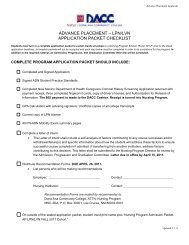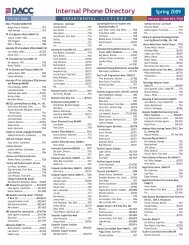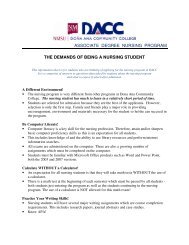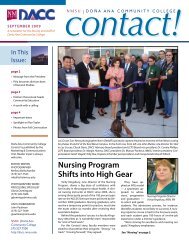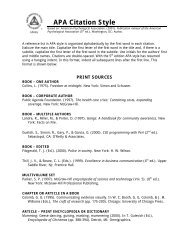Download - Dona Ana Community College
Download - Dona Ana Community College
Download - Dona Ana Community College
Create successful ePaper yourself
Turn your PDF publications into a flip-book with our unique Google optimized e-Paper software.
DACC Nursing Program Student Handbook 2012-2013to applicable policies in the DACC Nursing Program Student Handbook and the DACC StudentHandbook.3.3.1 Didactic: The nursing course instructor is responsible for evaluating all student conduct andbehavior. Disruptive student behavior is detrimental to the academic community because itinterferes with the learning process for other students, inhibits the ability of instructors to teachmost effectively, diverts university energy and resources away from the educational mission, andmay indicate a significant level of personal problems or distress on the part of the disrupter.Disruptive behavior is defined as repeated, continuous, and/or multiple student behaviors thathinder the ability of instructors to teach and students to learn. A nursing student engaging indisruptive behavior and/or an act of misconduct can be immediately dismissed from the class andcan potentially jeopardize the student‘s standing in the program.Common types of disruptive classroom behavior include, but are not limited to: Grandstanding (Use the classroom for themselves by monopolizing class discussion,speaking; protractedly and bombastically on favorite subjects with no regard to relevancyto the discussion.) Sleeping in Class (While passively disruptive, it sends a message to the other studentsabout the quality of the class or teaching. It is disrespectful to the instructor and the otherstudents.) Prolonged Chattering (Small cliques of 2-3 students who engage in privateconversations or pass notes to each other.) Inattentive to Scheduled Course Times (Students who not only come in late, but makean entrance speaking to friends, walking in front of the professor, arranging theirbelongings; Leaving class early.) Excessive Noise (Electronic devices going off in class; Use of cell phones during theclass; Creating excessive noise with papers, book bags, etc.) Disputing the Instructor’s Authority or Expertise (Students may be disappointed orfrustrated over a grade and may debunk or devalue the instructor‘s judgment, authority,and expertise. This may take the form of comments in the class or memos to the programdirector or division dean; Constant questions or interruptions which interfere with theinstructor's presentation; Failing to respect the rights of other students to express theirviewpoints.) Verbal or Physical Threats to Students or Faculty (Some verbal threats are veiledwhile others are more explicit. A threatening student may approach the instructor orfellow students menacingly, or actually shove the individual, or worse, physically assaultthem.) Overt inattentiveness (This can include sleeping, reading the paper, using laptops fornon-class-related activities; Sleeping in class; Inordinate or inappropriate demands fortime and attention.)3.3.2 Clinical: The student shall be held accountable for professional conduct and legalstandards of competent practice, as applicable under the NMNPA, and shall engage incompetent nursing care. Occurrences of unprofessional conduct shall be identified by thesupervising nurse and/or nursing instructor. Please refer to NM Nurse Practice Act (NMNPA,17 | P a g e



